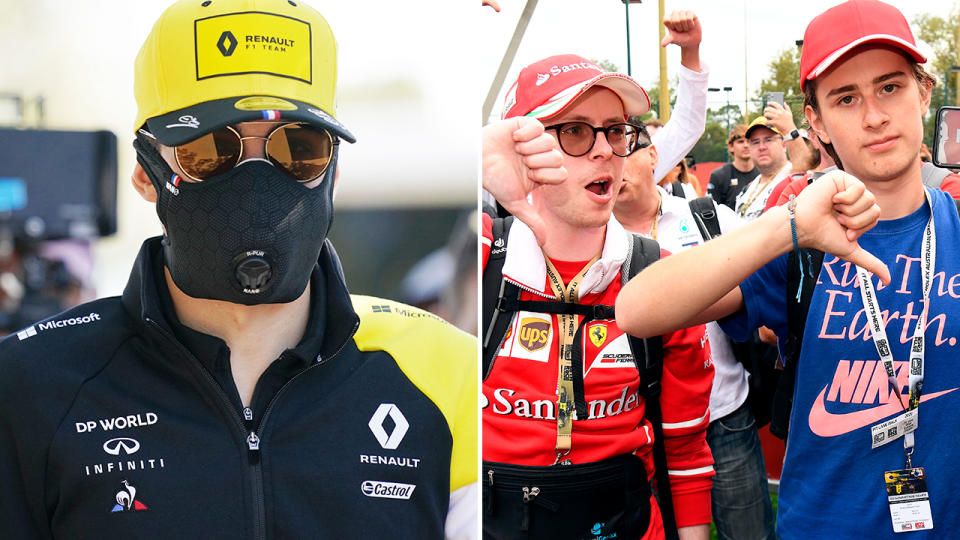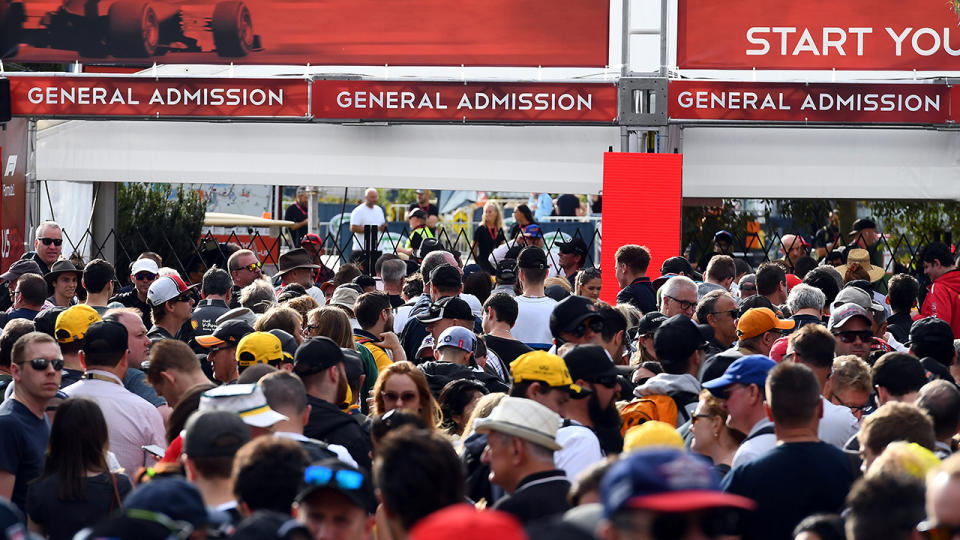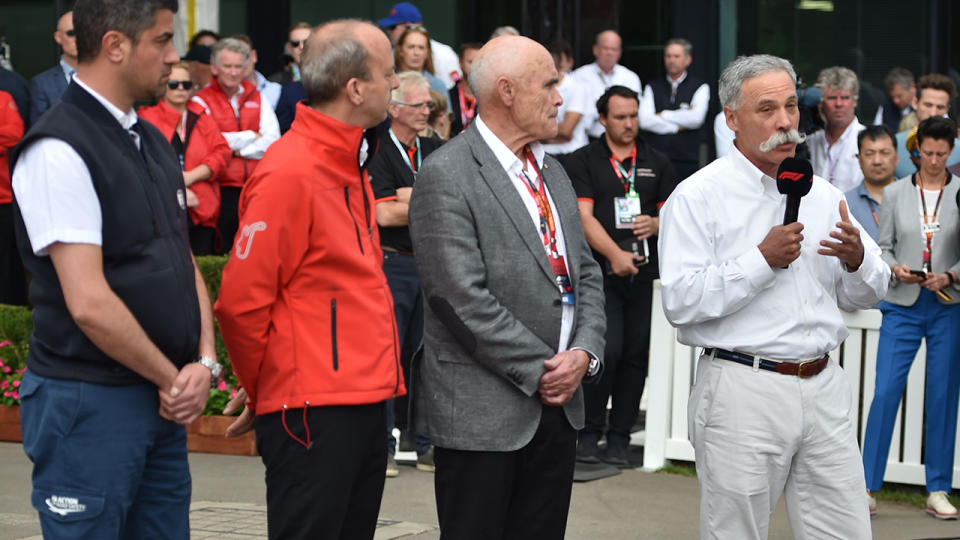Ugly $60 million theory behind Australian Grand Prix 'disgrace'
As the Formula One world continues to come to terms with the cancellation of the Australian Grand Prix, questions remain as to why it took so long for officials to call the event off.
After McLaren withdrew from the event when a member of their team tested positive to coronavirus on Thursday, it was reportedly decided at about 2am on Friday that the Grand Prix could not proceed.
‘DOUBLE DISASTER’: F1 cancels more races after Australian GP
‘WE’RE PROTECTED’: Margaret Court slammed over coronavirus claims
It is understood the 10 teams voted 7-3 in favour of the race being cancelled in a meeting in the early hours of Friday morning.
A number of media outlets then reported the race would be cancelled, yet it took until about 10am for the official word to come through from organisers.

By that stage thousands of fans were already at Albert Park waiting in queues to get inside - the kind of situation the cancellation of the event was designed to avoid.
To make matters worse, Australian Grand Prix boss Paul Little had earlier told local breakfast television that the race would go ahead.
Fans were absolutely seething that it took F1 and the FIA so long to confirm the cancellation, describing the situation as a ‘disgrace’ and ‘shambolic’.
Adelaide man James Manos told AAP he was furious with F1 and Grand Prix officials for not making a decision on the race sooner.

“The fact that everyone lined up this morning was ridiculous,” he said.
“I don't think anyone had the balls to say it was off earlier.”
Melbourne's James Haworth, who has been coming to the Grand Prix for 25 years, said he was “not angry, more upset”.
“You were standing at the gate and blokes on the PA were saying 'relax, you'll be all in soon,” he said.
“You're supposed to be in by 8.30am, you know they're not opening up.”
This is all F1 and FIA have to say.
Shambolic. Absolutely shambolic. Zero guidance. Zero actual information. https://t.co/uYlGV3PEqU— Luke Smith (@LukeSmithF1) March 12, 2020
two hours till fp1 at the #AustralianGP and no one has a clue what’s going on. the way the fia have handled this is utter shambolic.
— Josh Love (@joshlove09) March 12, 2020
It’s such a disgrace @F1 and @fia leadership is taking a long time to make a decision on cancelling the #AustralianGP
— Amarnath Nagula (@amarnath143_IN) March 12, 2020
Thought I’d come back to check the status of the #AustralianGP about 6 hours after McLaren pulled out, assuming that surely to Christ there would be some news.
Shockaroony - there is not.
What a disgrace #F1— Hayley Stanway (@HayleyStanwayF1) March 12, 2020
So @LewisHamilton was right Cash is king. Absolute disgrace #AustralianGP
— Kevin Holloway (@kevh46) March 12, 2020
Its taken @F1 all day to confirm the #AusGP is cancelled. Total disgrace messing F1 fans around.#AustralianGP #F12020
🏎️🇦🇺❌ https://t.co/edLyISIhi2 pic.twitter.com/6gq64Y0Fca— Mike🏏⚾️🏀🏈🏳️🌈 (@CricketStatz) March 12, 2020
It remains hard to believe that the event was ever going to proceed at any stage on Friday.
Some of the sport's biggest names refused to compete due to the McLaren positive test, with former world champions Sebastian Vettel and Kimi Raikkonen believed to have flown out of the country by the time the race was officially called off.
‘Cash is king’: Ugly theory behind Grand Prix ‘shambles’
Mercedes star Lewis Hamilton put pressure on officials with his scathing criticism of F1's handling of the situation earlier on Thursday, saying it was “shocking” that the teams were even in Australia in the first place.
Hamilton claimed on Thursday the only reason the season opener was still scheduled to be held was because “cash is king” for F1.
It’s been reported that the Melbourne government injects about $60 million into the Australian Grand Prix every year.
However F1 CEO Chase Carey refuted those claims on Friday.
“If cash is king we wouldn't have made the decision we made today,” he said after the race cancellation.
“As the situation changed day to day, and sometimes hour to hour, we continued to evaluate that and made the appropriate decision.”

Carey said the lateness of the cancellation was based on an update received from the Victorian government's chief health officer.
“I want to express our disappointment on behalf of the fans,” he said.
“(But) in many ways this is an unprecedented situation. I have never lived through anything like this.
“You have to digest (information) and make the decision you think is right, and I think we did here.”
Michael Lynch, senior sports reporter for The Age, described Friday as “one of the most disastrous events in F1 history.”
“Now that the circus has belatedly folded its tents the arguments and recriminations will begin, with questions sure to be asked about the government's multimillion dollar investment in the event and what will happen to that money,” Lynch wrote on Friday.
“Plenty will share Hamilton's view and wonder whether cash was indeed king, right up to the last moment when public health concerns became simply too great to ignore.”
F1 forced to cancel more races
Formula One bosses are now set to delay the start of the new season until June after the Bahrain and Vietnam Grands Prix were also postponed.
Next weekend's behind-closed-doors race in Bahrain, and the inaugural round in Vietnam's capital Hanoi, which had been pencilled in for April 5, have since been called off.
It is understood that the view of the sport's travelling circus is to delay the campaign until the Azerbaijan Grand Prix, pencilled in for June 7, at the earliest.
As it stands, the season is due to end in Abu Dhabi on November 29, but it is understood the race could be pushed back until December to allow room for next month's already postponed Chinese Grand Prix, and the race in Hanoi to be squeezed back into a rejigged calendar.
The Dutch Grand Prix, the first in Holland for 36 years, is due to take place on May 3, but that might now be moved to August, with the sport's customary summer break scrapped. As many as 18 races might be staged in six months.
The historic Monaco Grand Prix, set for May 24, could become the sport's biggest casualty, while there may also be no room for the races in Bahrain and Spain.
There are no plans for the round in Melbourne to be rescheduled for later in the year.
with AAP

